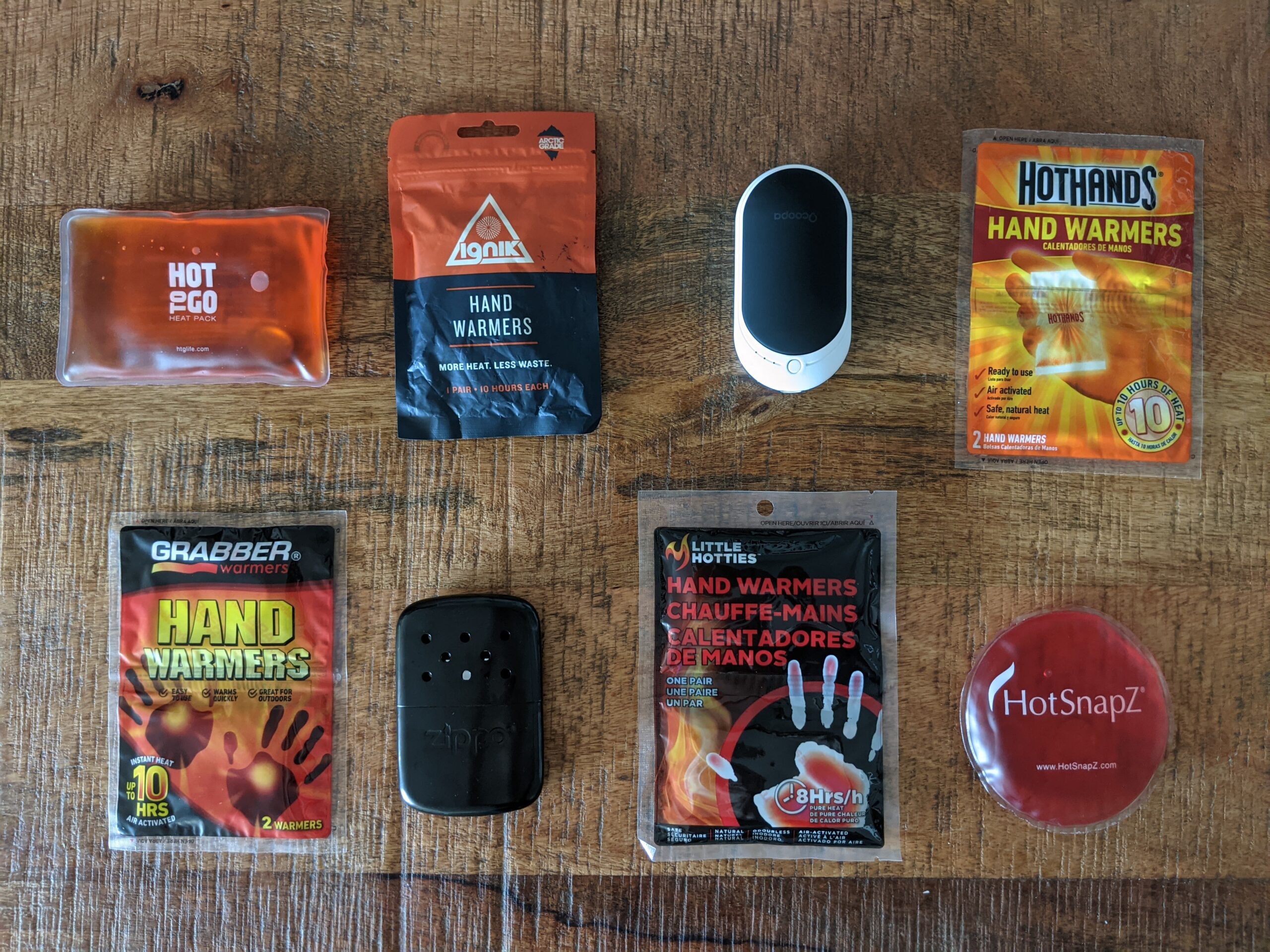The Best Home Defense Shotguns of 2024, Range Tested
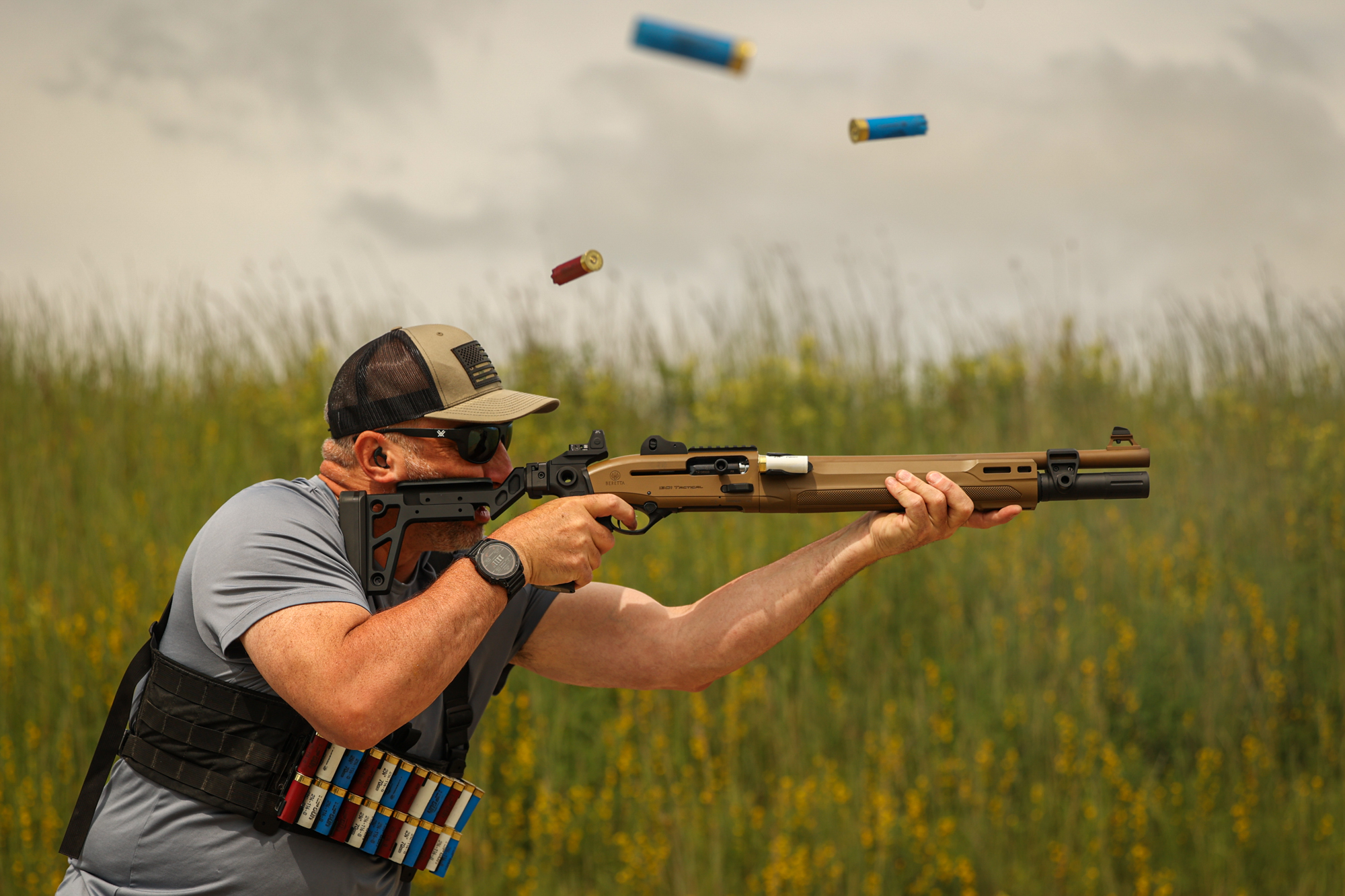
We may earn revenue from the products available on this page and participate in affiliate programs. Learn More ›
Evaluating the best tactical shotguns and home defense shotguns is a different kettle of fish compared to testing their sporting and hunting counterparts. While tactical shotguns share the basic operating principles as smoothbores designed for birds and busting clays, they serve a radically different purpose.
Defensive shotguns are designed to stop threats from assailants and dangerous animals, rather than pluck birds and clays from the sky. These are large targets, typically engaged at very close range, that require a gun with stopping power rather than one that prioritizes a sweet swing.
This specific mission informs the thinking behind the construction of defensive and tactical shotguns. Hence the predominance of extended magazine tubes, pistol grips, oversized controls, aggressive texturing, shorter barrels, and mounting points for slings, lights, red dots, shell carriers, and other hardware.
How We Tested Home Defense Shotguns
We assembled a field of seven popular or new tactical shotguns, mounted red dot sights on them (from Vortex, Trijicon, and Holosun), and put them through the type of real-world torture test that is the hallmark of all our gun tests. This involved a lot of trigger pulling — hundreds of rounds through each gun over the course of a week — using a cross section of ammo. We conducted this year’s test at Brownells’ home range outside Grinnell, Iowa, which was an ideal venue.
This year the test team included editor-in-chief Alex Robinson, executive editor Natalie Krebs, freelance writer and competitive three-gunner Matt Foster, and yours truly.
The Ammo We Used
Higher end target loads included Federal’s High Overall and Remington’s Premier STS. But we also burned up a bunch of more affordable target loads including Federal Top Gun and Remington Gun Club target loads.
Buckshot loads included Hornady Critical Defense, Remington Ultimate Defense, and Federal Copper Plated. We shot slugs for record with Remington Slugger, Federal Truball, and Hornady American Gunner.
How We Grade Home Defense Shotguns
We ran the guns on different target arrays and patterned them with buckshot at different distances. We shot IPSC targets, putting one 00 buckshot round on target at 7 yards and then two shots on target at both 15 yards and 25 yards. We then tallied the number of pellet strikes within the different target zones at each range. We also gathered group size data with the slugs at 25 yards, shooting 10-shot groups with three different loads. Our goal was to leave no stone unturned to reveal each shotgun’s strengths and weaknesses. As always, it was an illuminating exercise.
Each shotgun is evaluated on eight categories and given a score of 1 to 5 from each judge. We average these scores for each category and use their total to determine the ranking and awards. The categories are handling, workmanship, aesthetics, ergonomics, meets purpose, versatility, reliability, and value.
The scores then translate to the grades on the report cards for each firearm. Performance consists of the scores from handling, ergonomics, and reliability. Design includes workmanship, aesthetics, meeting its purpose, and versatility. Value stands on its own.
To earn an “Excellent” rating, the average of that score must be 4.5 or higher, a difficult mark to hit. “Very Good” is an average score of 3.5 to 4.5; “Good” is from 2.5 to 3.5; “Fair” is from 1.5 to 2.5; and “Poor” is under 1.5.
Best Home Defense Shotguns of 2024, Reviews & Recommendations
See It
Report Card
- Performance: Excellent
- Design: Very Good
- Value: Very Good
Beretta 1301 Tactical Mod 2 Specs
- Gauge: 12
- Action: Semi-auto, gas
- Capacity: 7+1
- Chamber: 3 inches
- Weight: 6.80 pounds (measured)
- Trigger Weight: 2.88 pounds (measured)
- Barrel Length: 18 inches
- Overall Length: 37.8 inches
- LOP: 13 inches
- Sight: Ghost ring, rail included
- Barrel Finish: FDE
- Stock: Folding
- Price: $2,279
- Includes: CL, OCHP flush choke

In the world of defensive and tactical shotguns the Beretta 1301 Tactical Mod 2 stands apart. There are a lot of interesting shotguns in the space that bring much to the party in terms of value, features and performance, but this iteration of the 1301 sets a new highwater mark for the category.
Thanks to its excellent trigger, ergonomic safety, and superlative gas-operated action, the Beretta 1301 Mod 2 is by far the fastest shotgun we evaluated. The clean trigger break and short trigger reset, along with the speed and reliability of the action, lets the shooter run shells through it at a break-neck clip while retaining control. This is true whether we were firing light target loads or defensive slug and buckshot rounds.
The 1301 Tactical comes with an excellent, and durable, adjustable ghost-ring rear sight and fixed front-post that are protected by beefy wings. There’s also a section of Picatinny rail in front of the rear sight for mounting a red dot, as well as a mounting plate on the folding stock that accepts RMR pattern red dots. This gives the operator a lot of options when it comes to selecting a sighting system. That flexibility is complimented by the folding stock from Chisel Machining that adjusts for LOP and cheek height so you can match the gun’s dimensions to the shooter for a perfect fit.
The folding stock can also accommodate a shell carrier (which we didn’t have), and even when folded, lets the shooter run the gun. It’s a great design.
The fore-end has deep knurling on it for a positive grip and includes three M-Lok slots at the front end for mounting lights or other accessories.
Our sample came with the optional MatchSaverZ, which is a bracket that holds an extra shell and screws into the fore-end just ahead of the loading port. When you run the gun dry all you have to do is strip the shell out (with the proper technique) and it will glide into the open port for an extra shot.
The shotgun loads in a glassy-smooth manner and we could stuff shells into it nearly as fast as we could shoot the gun dry. The lifter doesn’t pinch or bind on your fingers — even if you don’t employ a refined reloading technique. The gun is remarkably forgiving. One ding we found was that we had trouble loading the magazine with a full seven rounds. Sometimes the gun would function with a full seven-round mag, other times it would fail to feed. Ultimately, we settled on a 6+1 capacity and had no more problems.
The Beretta 1301 Tactical shot both slugs and buckshot exceptionally well. It averaged 1.939-inch, 10-shot groups at 25 yards across three different rifled slug loads. With Hornady’s Critical Defense 00 buckshot, all pellets landed within the A Zone of an IPSC target at both 7 yards and 15 yards. At 25 yards, all but two pellets hit within the A Zone and C Zone (those two pellets ended up in the D Zone).
I’ll publish a longer full-length review of this shotgun soon, but suffice to say that it is a gun we can recommend without qualification, and while the $2,500 price tag is steep, it is worth every penny.
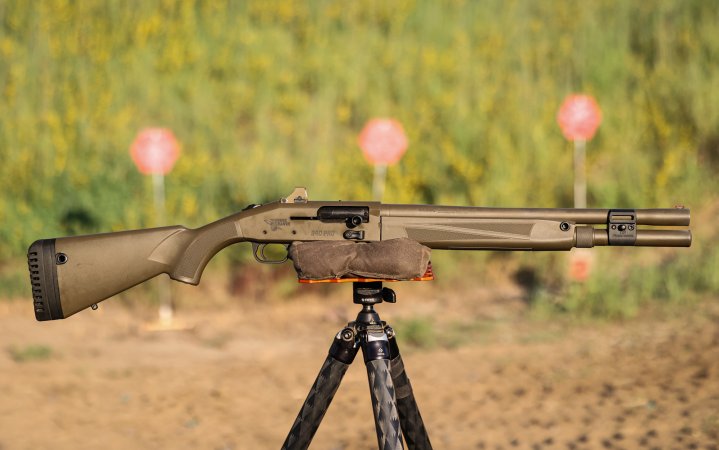
See It
Report Card
- Performance: Very Good
- Design: Good
- Value: Very Good
Mossberg 940 Pro Tactical Thunder Ranch Specs
- Gauge: 12
- Action: Semi-auto, gas
- Capacity: 7 +1
- Chamber: 3 inches
- Weight: 7.5 pounds (measured)
- Trigger Weight: 2.68 pounds (measured)
- Barrel Length: 18.5 inches
- Overall Length: 37 inches
- LOP: 12.5 to 14.25 inches
- Sight: Red bar, optics ready receiver cut
- Barrel Finish: Cerakote
- Stock: Synthetic, patriot brown
- Price: $1295
- Includes: Fixed cylinder choke
We’ve been big fans of the Mossberg 940 series since it debuted, and have been very happy with their competition, hunting, and defensive models. The 940 Pro Tactical Thunder Ranch is an extension of this winning formula and was one of our favorite shotguns at this year’s test.
Like other 940s, the Thunder Ranch is easy to load, can be run really fast, is durable and reliable, and represents a great value. As much as we gushed over the Beretta 1301 Mod 2, this shotgun makes a strong case in a head-to-head shootout, especially in light of its budget-friendly price.
The receiver includes an optics cut that we affixed a red dot to, making the shotgun a formidable tool. We had no issue keeping that dot on our target during drills with lots of transitions and while shooting quickly.
The word that kept cropping up during the evaluation to describe the action was “snappy” and we never felt like we were in danger of outrunning the gun. It is super fast.
The Thunder Ranch does have a couple limitations that help explain its attainable price. The barrel has a fixed-cylinder bore and only comes with a basic front bead for sighting unless you add a rail or use the optics cut to mount a red dot.
The shotgun ran without any issues, but the charging handle on ours did get a bit wiggly — not to the point where it affected performance but it was a little distracting to our picky, eagle-eyed judges.
From a patterning and accuracy standpoint, the 940 was an overachiever. It recorded our tightest slug group of the test, putting 10 Remington Slugger loads within a 1.149-inch group at 25 yards. With Hornady Critical Defense buckshot loads it put all pellets inside the A Zone at 7 yards and 15 yards. At 25 yards it put all pellets inside the A Zone and C Zone.
The safety on the rear of the receiver works great, toggling back and forth in an easy and positive fashion. The safety tab itself has enough relief for your thumb to gain easy purchase, but it isn’t obtrusive or overly bulky.
One interesting refinement is the cocking indicator on the inside of the trigger guard, which is a feature on other 940s as well. This allows you to ascertain the status of the gun in the dark by pressing the back of your trigger finger against the front of the trigger guard to feel for the protruding bit of metal that indicates that the action is cocked.
The gun has sling mounts for both QD attachments and traditional swivel studs, giving you some flexibility in that regard. If you want to mount a light on the gun, you can use the M-Lok slots on the barrel clamp for that purpose.
In a competitive field of defensive and tactical shotguns the Mossberg 940 Tactical Thunder Ranch is one of the best values, and was a consensus choice for a Great Buy award.
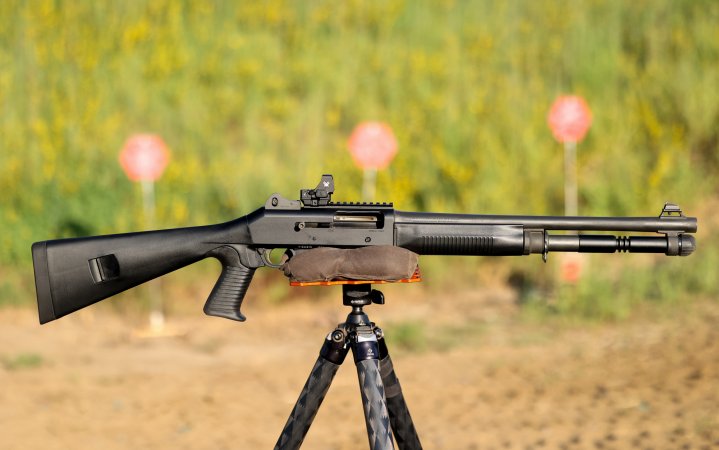
See It
Report Card
- Performance: Good
- Design: Good
- Value: Good
Benelli M4 Specs
- Gauge: 12
- Action: Semi-auto, gas
- Capacity: 5 +1
- Chamber: 3 inches
- Weight: 7.8 pounds (measured)
- Trigger Weight: 4.06 pounds (measured)
- Barrel Length: 18.5 inches
- Overall Length: 40 inches
- LOP: 14 3/8 inches
- Sight: Ghost ring, includes rail
- Barrel Finish: Black phosphate
- Stock: Synthetic
- Price: $2,299
- Includes Modified choke
The Benelli M4 is one of the most legendary firearms of the modern era and is an OG semi-auto tactical shotgun. It was introduced 25 years ago, and even though the world of defensive and tactical shotgun shooting has evolved considerably over the last quarter century, the Benelli M4 still holds its own.
The reliability of the gas-operated M4 is one of its best-known qualities, and true to form our sample ran flawlessly. We had no malfunctions of any type, whether running light target loads or defensive slugs.
The gun’s heft and pistol grip make it feel solid and comfortable in hand even when pounding targets with hefty buckshot.
Despite this — and this will sound like sacrilege to some — the M4 is showing its age and could benefit from an update.
It has small, undersized controls and from an ergonomic perspective doesn’t operate very smoothly. It is stiff to load, the bolt release button is small and stiff to depress, and the gun requires excessive effort to run.
The fore-end could use more aggressive texturing to give a better grip. The horizontal cuts in the fore-end don’t offer the kind of purchase other shotguns in the category have.
It also isn’t accessory friendly. It doesn’t have QD cups, M-Lok slots, or any type of rail other than the one on top of the receiver. If you want to mount a light on it you’re going to need to purchase aftermarket hardware.
The 5+1 capacity is also out of step with other offerings in the tactical shotgun market. This isn’t a deal-breaker, but is another indication of how tactical shotguns have advanced since the M4 was introduced.
During the accuracy portion of the test, three 10-shot groups with the slugs averaged 3.546 inches at 25 yards, with the Hornady American Gunner (2.957 inches) and Federal Truball (2.982 inches) loads being nearly identical.
The M4 did a good job patterning buckshot. At 25 yards it kept all its pellets in the A and C Zones with Hornady Critical Defense, and all pellets in the A Zone at 7 and 15 yards. With the Remington buckshot, it kept 15 out of 18 pellets (two shots) in the A and C Zones, while pushing three into the D Zone. Also, very good performance.
It is still a great gun — make no mistake about it. But if it wants to reclaim the position it once held as the baddest tactical shotgun in the world it is going to need a makeover.
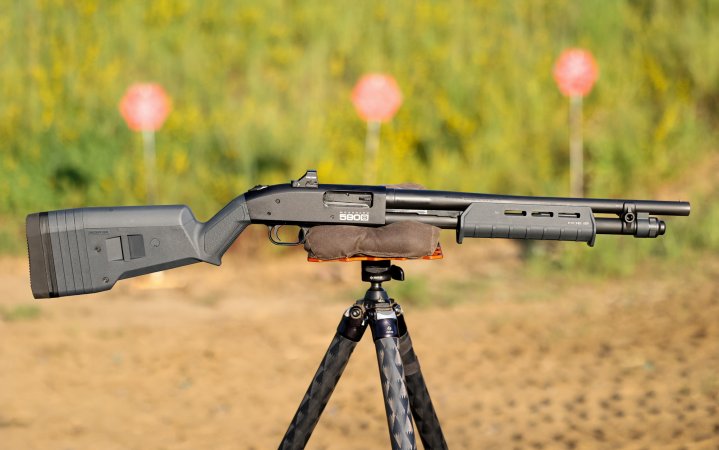
See It
Report Card
- Performance: Good
- Design: Good
- Value: Good
Mossberg 590S Magpul Holosun Micro Dot Combo Specs
- Gauge: 12
- Action: Pump
- Capacity: 5 +1
- Chamber: 3 inches
- Weight: 6.75 pounds (measured)
- Trigger Weight: 3.43 pounds (measured)
- Barrel Length: 18.5 inches
- Overall Length: 38 inches
- LOP: 12.25 to 14.5 inches
- Sight: Mounted Holosun HS407K
- Barrel Finish: Matte blue
- Stock: Magpul SGA Adjustable Stock and MOE Forend
- Price: $1,035
- Cylinder choke
The Mossberg 590S Magpul Holosun Micro Dot Combo was the only pump-action in the roundup, making it the odd man out in the field of tactical shotguns. But this old warhorse (the 590s have been seeing military service since 1987) is still a relevant home defense shotgun.
Mossberg 590s come in numerous configurations, and this version sports an adjustable Magpul stock and fore-end and includes a Holosun HS407K red dot pre-mounted on the receiver. It is one of the fancier stock 590s ever offered and therefore carries a price tag just north of $1,000.
This combo model is built on a durable and proven platform. The gun features dual extractors on the bolt face, dual action bars, and Mossberg’s “anti-jam” elevator.
These elements contribute to the shotgun’s reliability, and indeed we didn’t have any issues with feeding or ejection.
The fore-end includes M-Lok slots for mounting accessories and is contoured in such a way to provide good grip.
This shotgun has ambidextrous elements, including the safety that’s mounted on the back of the receiver and a reversible barrel band so it can be slung on either side.
While this 590 runs well we found it a bit clunky and rough to cycle and, because it is a pump-action, it couldn’t rival the semi-autos in terms of speed during our drills. Switching between it and all the semis was a good reminder for the need to practice with a pump if you’re going to rely on one for personal protection.
In terms of accuracy, it showed a clear preference for the Remington Sluggers, with which it printed a 2.26-inch 10-shot group at 25 yards. It didn’t like the Federal Truball one bit (7.95 inches), while the Hornady American Gunner slugs (4.036 inches) fell in the middle.
It did fine with the buckshot, printing solid A and C Zone patterns at 7 and 15 yards. At 25 yards it still put more than enough shot in the middle of the target to be lethal, but it did kick a small number of pellets off target at that distance.
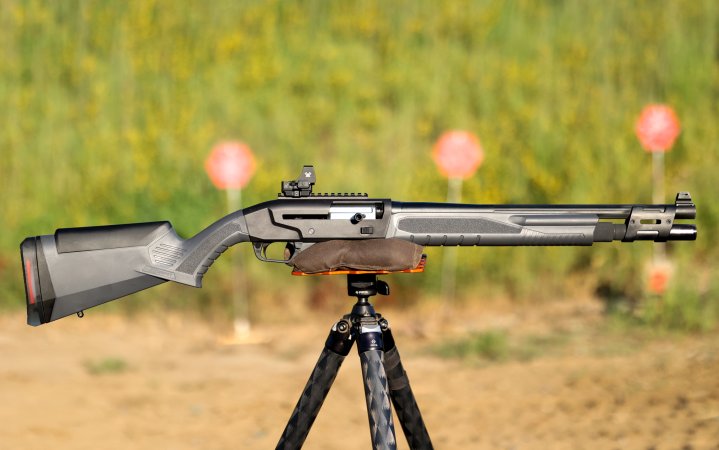
See It
Report Card
- Performance: Good
- Design: Good
- Value: Good
Savage Renegauge Security Specs
- Gauge: 12
- Action: Semi-auto, gas
- Capacity: 6 +1
- Chamber: 3 inches
- Weight: 7.5 pounds (measured)
- Trigger Weight: 3.47 pounds (measured)
- Barrel Length: 18.5 inches
- Overall Length: 40 inches
- LOP: 14.25 to 15 inches
- Sight: Ghost ring (rail not included)
- Barrel Finish: Melonite
- Stock: Synthetic
- Price: $1,279
- Chokes included: F, M, IC (Invector Plus)
The Savage Renegauge Security is a really enjoyable shotgun to use — it runs much smoother than the blunt angular lines on the stock and receiver suggest. In terms of speed, it was one of the quicker guns in the field, cycling in a fast, assured manner that let us put shots on multiple targets easily.
Among the Renegauge Security’s virtues are the ease with which it loads and the adjustability of the stock, which comes with LOP spacers and the ability to swap inserts to adjust the comb height.
The one main issue we had with our sample was the stiff crossbolt safety that took a lot of effort to move back and forth, especially when starting the gun from the low ready; the safety would often get hung up. This had a major impact on the speed with which we could get off an initial shot. In competition it would be an annoyance, but for a tactical shotgun and home defense shotgun it is a serious drawback.
The shotgun comes with good ghost-ring sights, but no rail. We purchased one separately in order to mount a red dot on it, as we did with all the other guns in the test — so that’s something prospective buyers should keep in mind.
The Renegauge wasn’t one of the tighter-shooting guns when it came to accuracy testing with slugs but it was fairly consistent from one load to the next. The average 10-shot group at 25 yards was 3.65 inches, with the groups ranking as follows: Federal Truball (3.128 inches), Hornady American Gunner (3.702 inches), Remington Slugger (4.136 inches).
With buckshot it kept all pellets in the A Zone at 7 yards, and the majority in the A Zone at 15 with a small number of charlies. At 25 yards it delivered okay patterns with the Remington Ultimate Defense double-ought, with nine alphas, one charlie, six deltas, and two misses. The Hornady buckshot patterned roughly the same with five alphas, 6 charlies, 2 deltas, and three misses.
The gun’s aesthetics are in keeping with other firearms in the Savage lineup. If you look at the chunky cocking serrations on the slide of the Savage 1911, for instance, you’ll see the family resemblance. The vibe is purposeful rather than elegant, and gives the Renegauge a no-nonsense, almost Soviet-era, feel.
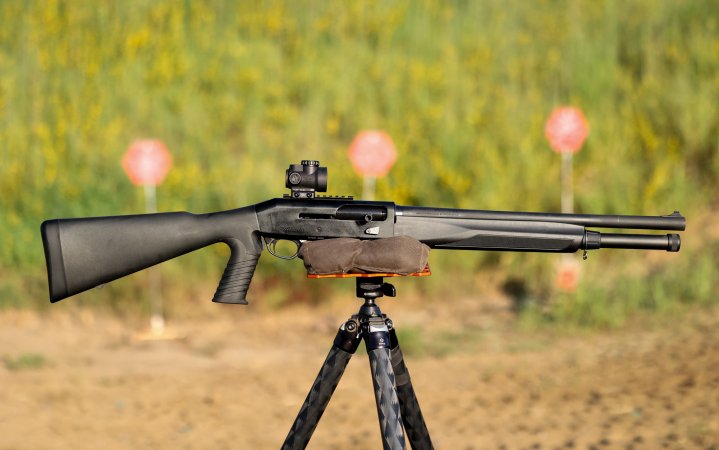
See It
Report Card
- Performance: Fair
- Design: Fair
- Value: Fair
Stoeger M3000 Pistol Grip Specs
- Gauge: 12
- Action: Semi-auto, gas
- Capacity: 7 +1
- Chamber: 3 inches
- Weight: 6.95 pounds (measured)
- Trigger Weight: 3.01 pounds (measured)
- Barrel Length: 18.5 inches
- Overall Length: 40.25 inches
- LOP: 14 3/8 inches
- Sight: Bladed front sight
- Barrel Finish: Matte bluing
- Stock: Synthetic
- Price: $583
- Choke: Fixed IC
The Stoeger M3000 Pistol Grip shotgun borrows much from the Benelli M1 through M3 series shotguns — on paper at least. They have similar inertia-driven actions (not to be confused with the M4’s ARGO gas-operated action), the M3000’s silhouette is much the same, and Stoeger is a fully-owned subsidiary of Benelli — which is, in turn, owned by Beretta.
As with other Stoegers, the M3000 Pistol Grip, is Turkish rather than Italian-made, and comes in at a budget-conscious price point. At less than $600, a defensive shotgun of this type would be a great buy, but even so we found ourselves hard pressed to recommend it.
It had a few drawbacks that, in aggregate, caused us to reach this conclusion. This list includes the problems the gun had cycling light target loads, its harsh felt-recoil (typical of inertia driven actions), and the slick fore-end with no texturing that was difficult to grip securely. The shotgun did not come with a rail for mounting optics.
During accuracy testing with slugs, it was particularly vexing to cope with the gun’s recoil and hang onto the stock. The pistol grip beat up the webs of our hands and the whole process was noticeably more trying with the Stoeger than with other guns.
That said, it averaged 3.079-inch 10-shot groups at 25 yards with slugs, which is respectable. It shot both the Hornady and Remington buckshot very well at 7 and 15 yards, but showed a strong preference for the Hornady Critical Defense at 25 yards. At that distance it kept all 16 pellets in the A (12 pellets) and C (four pellets) zone with two shots, while the Reminton buckshot did much worse. (Three alphas, seven charlies, three deltas, and five misses.)
The trigger has a fair bit of creep but breaks at a reasonable 3 pounds, and the barrel has a fixed IC choke with a single blade front sight up top and no rear sight — one of the design concessions the company made to keep the price low.
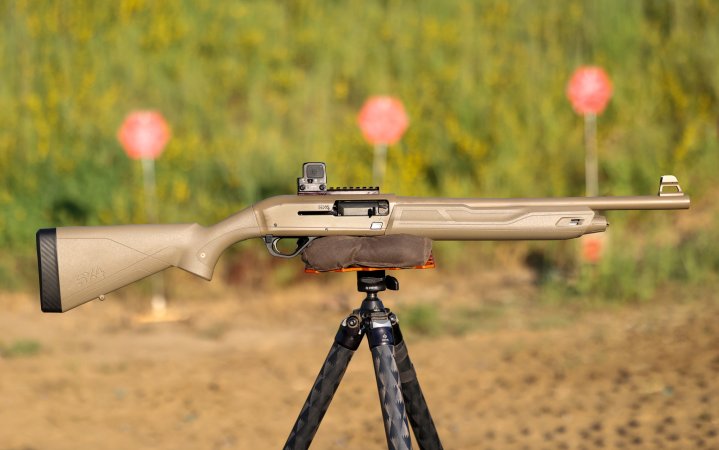
See It
Report Card
- Performance: Fair
- Design: Fair
- Value: Fair
Winchester SX4 Defender Specs
- Gauge: 12
- Action: Semi-auto, gas
- Capacity: 4 +1
- Chamber: 3 inches
- Weight: 6.87 pounds (measured)
- Trigger Weight: 4 pounds (measured)
- Barrel Length: 18 inches
- Overall Length: 39.5 inches
- LOP: 14.25 inches
- Sight: Ghost ring (rail included)
- Barrel Finish: FDE Cerakote
- Stock: Synthetic
- Price: $1,190
- Chokes included: F, M, IC (Invector Plus)
We have been big fans of the Winchester SX4 platform since it debuted a few years ago. The SX4 has earned awards from our judges during past tests and high praise in individual reviews. But those were for hunting guns, and we’re not sure the SX4 magic translates as well in a tactical shotgun.
Here are some of the pros and cons we encountered. On the pro side, the shotgun ran well, other than a couple feeding issues over the course of the test. It comes with a good ghost ring sight setup and includes a Picatinny rail to mount a red dot or other optic. The crossbolt safety is generously sized, making it easy to find, though ours was a little sticky. The bolt release tab, while not the size of some of the furniture on other tactical shotguns, was also quick to locate and manipulate.
The Defender, like other members of the SX4 family, pointed well and was nimble from the shoulder.
When it comes to the cons, the biggest issue was the amount of blowback the shotgun pushed back into our face, especially when shooting high-powered loads. It was extremely distracting, and while one should always wear eye protection when shooting, the quantity of gas the Defender expelled makes it an absolute requirement.
We also found the texturing on the grip and fore-end inadequate for serious tactical shotgun use. We had a hard time hanging onto it when running it hard and fast with heavy loads.
It also lacks some other elements commonly found on better tactical shotguns. The stock doesn’t adjust at all. There’s no provision for mounting a light on the fore-end. It only has basic swivel studs for a sling. The capacity is just 4+1.
While the FDE Cerakote is certainly durable, the overall aesthetic of the Defender is pretty plain. Even offering it in a two-tone configuration, with an OD Green stock to offset the FDE metalwork would go a long way to give it more visual appeal.
During the accuracy portion of the test, the Winchester SX4 Defender shot Hornady’s American Gunner slug load well, printing a 1.994 inch 10-shot group at 25 yards, which was one of the top groups of the test. It did fine with buckshot as well, easily keeping the pellets centered up in the A and C Zone out to 15 yards, and printing solid patterns at 25 yards with the Hornady Critical load, with no pellets flying wide.
Final Thoughts on the Best Home Defense Shotguns of 2024
This was an exciting field of home defense shotguns to test, and through serious use and analysis we could really see how one gun differs from the next.
Because these shotguns might be employed in a life-saving scenario, we dinged those that didn’t feed properly, and that were more difficult to manage with powerful defensive loads. Those are two non-negotiable issues for a proper tactical shotgun in our way of thinking, and are reflected in the scores and comments above.
One shotgun that isn’t in the test is the Beretta A300 Ultima Patrol. We wanted to get one, but weren’t able to track one down in time for this evaluation. That said, we plan to test it soon and update this story with the results.
Read the full article here


